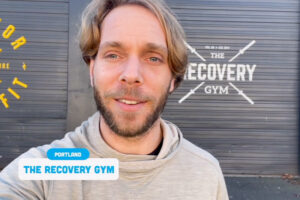Meditate for 5 Minutes a Day! (You Can Definitely Do This)
Stress everywhere, serenity in hiding? Meditation, even just a little bit, can work wonders on the mind in recovery. Here's how and why to give it a try

In recovery, you may have unlocked a new level in your day: the morning. It’s pretty common to sleep, sleepwalk or fumble through those early, hazy, fretful, regretful, fried-brain hours during active addiction, but now that you’re sleeping better and living more purposefully in the moment, having your mornings back can be a nice perk.
Or not — for some, it’s hard to shake the alarm-clock feelings of dread and stress anticipating the chores and crunches that may or may not lie ahead today. But if that’s how you wake up, overwhelmed and frazzled, the rest of the day is indeed more likely to feel like a slog, long and exhausting.
So take a beat and slow your roll. Meditation is a great way to clear your mind and pace out your thoughts. Starting your day with a simple five-minute meditation session can be incredibly beneficial, especially for those in recovery. A meditation exercise, even a super-quick one, allows those with busy morning schedules to get in their daily mindfulness session.
Remember, recovery is not just about healing the body but also the mind, and meditation is a handy, extremely easy way to work on this.
How Meditation Boosts the Brain
Recent research backs this up: Meditation has been proven to upgrade the brain. According to a UCLA study, it correlates with greater preservation of gray matter during aging. A pair of Harvard studies linked meditation to increased gray matter concentration in the parts of the brain related to learning, memory, emotional regulation, mood and overall psychological well-being.
Neuroscientist Sara Lazar, lead researcher on the Harvard team, pinpointed which areas of the brain benefit when you practice daily meditation:
- Left hippocampus: the area of the brain that helps with learning
- Posterior cingulate cortex: this part is associated with wandering thoughts and self-relevance
- Pons: this is responsible for neurotransmitters that regulate brain activity
- Temporoparietal junction: the part of the brain associated with empathy and compassion
One part of brain did shrink in Lazar’s study participants: the amygdala, which pumps up anxiety, fear and stress.
You feel these changes in the form of mental clarity, serenity, increased concentration and decreased agitation, among a host of other improvements to mental well-being and acuity. (The “Oxford Handbook of Positive Psychology” goes into more depth on this.)
And that’s before even getting into the physical health benefits of meditation, which are now also coming into focus (no pun intended) for researchers; “ACSM’s Health & Fitness Journal” provides a handy overview. At the end of the day — or better yet, the beginning — meditation is a great tool for those going through the recovery process, and it is quite easy to get started.
Mindfulness and Meditation in Recovery: Why To Do It
Starting your morning with meditation can give you many advantages — especially if you’re in recovery.
- Decrease in blood pressure
- Immune system enhancement
- Decreased anxiety
- Stress management
- Reduced depressive symptoms
These are just a few pluses. Meditation can also help those who are religious or spiritual (or thinking about it). Meditation comes in many forms, but in general, it promotes inner focus, emotional harmony and equanimity, which can help with spiritual exploration or identifying what’s meaningful to you in life.
You may also find meditation introduces you to other mindfulness-based activities that incorporate similar exercises, such as breathing exercises and yoga. For many, these form valuable holistic approaches to recovery that can clear the mind and reduce anxiety.
Learning to be mindful in recovery can be an important factor in your ultimate success. When you’re attuned to your thoughts and feelings and have a measure of control over your emotions, it helps propel you forward in your life — while you make peace with your past. Meditation, ultimately, is one of the best ways to start becoming more in tune with your mind and body. It teaches you to rein in, or at least manage, your most hectic thoughts and overwhelming feelings.
Step One: Where To Find Meditation Guides
Let’s make this even easier: You don’t need to go to meditation class to get started. Everything you need is online. A quick YouTube search will show you there are many (many!) different meditation styles, with varying levels of length and intensity.
It’s probably best to start with a beginner-level guide and zero in on those that require only five minutes. This will let you sample the variety and get a feel for what style best suits you. There are also resources for people who need more visual guidance that allow users to follow along with both commentary and visual representation.
Another way to find easy beginner-level meditation guides is to download an app. There are plenty of options, but here are a few:
- Meditopia: Meditation and sleep
- Breathwrk: Breathing exercises
- The Mindfulness App: Mindfulness and meditation
These guides can be valuable tools, as they typically have notification settings to help you create a daily routine. These apps all provide some free content, simple guided meditation sessions and more comprehensive, rigorous offerings, if you find yourself interested in going deeper.
Taking just five minutes every morning — half a snooze button’s worth of time — to do a simple meditation session can significantly impact your mood, thought processes, emotions and energy levels. It’s ideal for those struggling with addiction and mental health conditions, and it’s great in long-term recovery too. There is no right or wrong way to meditate; find the jam that best amps up your own physical and mental well-being.
When it comes to “putting in the work” of recovery, this is as basic and blissful as it gets, and it truly pays off.
More Lifestyle
The Definitive Guide to Sober Travel
Vacations shouldn't be nerve-racking, but in recovery, it's not always that simple. We asked three sober travel pros how to make your trips fun — and more fulfilling than ever.
Sure-Bet Sober Date Ideas
Ready to get back out there? Sober dating isn't so hard. But here are a few pointers anyway, to help you find your groove.
Sobriety Roundtable: What's Your Favorite Sober Activity?
From roller derby to CrossFit and dog fostering to splurging on Mexican, nine sober folks shared what they do for fun and fulfillment. Get some ideas for your own Dry January or longer-term sobriety!
The Joy of Baking (Sober)
Two months sober, Annie Zimmerman decided to make cookies. Now, her hobby turned passion yields fulfillment, connection and delicious soberversary cakes. Read the interview!
Now Elite NFL Players, They First Tackled Addiction | News Roundup
All Sober compiles the best of the latest headlines. Here's your addiction and recovery news for the week of Feb. 19, 2024!
All Sober in Chicago
A great town for recovery, come sun, rain or snow! Check out our video guide to the Windy City's best sober options for bars, bottle shops — and even an arcade with vintage games.
All Sober in New York
The Big Apple truly has it all — including a sober bar with a "witchy vibe" and an array of enchanting non-alc cocktails. Take a peek in our video guide to the sober city!
All Sober in Portland
Oregon's cultural capital may be weird and proud, but it's sober and proud too! We scoped out the coolest sober-friendly spots in our new video guide.










